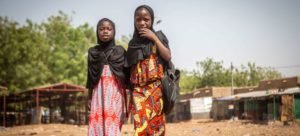President Joe Biden on Tuesday acknowledged how the horrific history of slavery has connected the United States and Angola while delivering a hopeful vision for the future in a major speech from a country that was the point of departure for millions of enslaved Africans.
“Our people lie at the heart of a deep and profound connection that forever binds Africa and the United States together. We remember the stolen men and women and children who were brought to our shores in chains and subjected to unimaginable cruelty,” Biden said in remarks at the National Museum of Slavery, which is built near the chapel where enslaved individuals were forcibly baptized before being sent to America.
The museum was built on the property of Álvaro de Carvalho Matoso, one of the largest slave traders on the African coast.
Biden told the attendees that he’s proud to be the first president to visit Angola and that he’s “deeply optimistic” about the future relationship between the nation and the US.
“The story of Angola and the United States holds a lesson for the world. Two nations with a shared history, an evil of human bondage. Two nations on the opposite sides of the Cold War, the defining struggle of the late part of the 20th century. And now, two nations standing shoulder to shoulder working together every day,” he said. “It’s a reminder that no nation need be permanently the adversary of another.”
Biden’s trip aimed to highlight US investments in Angola and the continent in the face of deepening Chinese influence in the region, as Beijing has poured hundreds of billions of dollars into Africa through its Belt and Road Initiative. Biden took a swipe at China’s moves, without calling out the country by name, and argued the US presents a better alternative.
“The United States understands how we invest in Africa is as important as how much we invest,” Biden said.
“In too many places, 10 years after the so-called investment was made, workers are still coming home on a dirt road and without electricity, a village without a school, a city without a hospital, a country under crushing debt. We seek a better way, transparent, high standard, open access to investment that protects workers and the rule of law and the environment. It can be done and will be done,” the president said.
Biden delivered his remarks even as he was grappling with an unexpected situation in South Korea, where President Yoon Suk Yeol declared martial law in a surprise late-night address Tuesday. The US is closely monitoring the situation and is in touch with the South Korean government, and Biden told reporters after his remarks that he would be getting a full briefing soon.
The president also reflected on a theme that he has mentioned throughout this presidency: his belief that it’s the United States’ duty to both acknowledge and face its history.
“While history can be hidden, it cannot and should not be erased. It should be faced. It’s our duty to face our history. The good, the bad and the ugly. The whole truth. That’s what great nations do,” he said.
Biden’s speech comes during what likely could be his last trip abroad as president and as he seeks to deepen relationships with Angola and other African nations at a time when China has made significant inroads in the continent with hundreds of billions of dollars of infrastructure investments, far outpacing the US.
During his remarks, Biden touted US efforts to expand its relationships across Africa, including billions of dollars in investments in Angola. He also announced over $1 billion in new US humanitarian assistance for Africans who have been displaced by historic droughts across the continent.
“But we know African leaders and citizens are seeking more than just aid. You seek investment. So, the United States is expanding its relationships all across Africa,” Biden said, adding later: “Moving from patrons to partners.”
Biden on Monday met briefly with Wanda Tucker, who is a descendant of William Tucker, the first enslaved child born in the United States. William Tucker’s parents, Anthony and Isabella, were taken on a Portuguese ship from Angola to colonial Virginia in 1619. Wanda Tucker now serves as the faculty chair of psychology, philosophy and religious studies at Rio Salado College in Arizona.
“It was the beginning of slavery in the United States. Cruel. Brutal. Dehumanizing. Our nation’s original sin. Original sin. One that’s haunted America and cast a long shadow ever since,” Biden said during his Tuesday remarks as he honored the Tucker family. “Here with us today are three Americans who are direct descendants of Anthony and Isabella, those first enslaved … Africans in America.”
Ahead of his remarks, the president also met with Angolan leaders, including young people and members of civil society, at the museum.
Biden started his day with a bilateral meeting with Angolan President João Manuel Gonçalves Lourenço at the presidential palace in Luanda.
The two men discussed trade and infrastructure, including the US and Europe’s investment in the Lobito Corridor, an unfinished 800-mile railway project meant to facilitate the transfer of critical minerals from interior countries to western ports for exports. They also discussed mutual security interests as Angola has played a key mediating role in the conflict in the eastern Democratic Republic of the Congo.
But Biden’s three-day trip to Angola, the first for a sitting US president, has at times been overshadowed by the president’s decision to pardon his son Hunter Biden, a move that drew swift backlash from members of his own Democratic Party on Capitol Hill. The president has not responded to reporters’ questions relating to the pardon during the trip.




